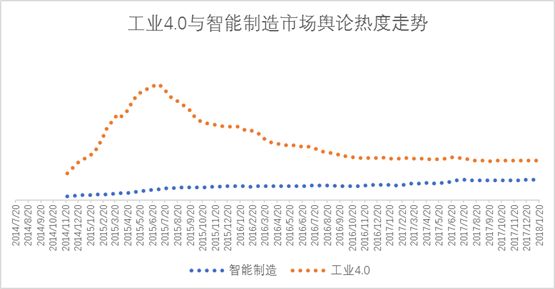The concepts of Industry 4.0 and Intelligent Manufacturing both made their debut in China in 2014. At present, many manufacturing companies find it difficult to distinguish between the two terms. In the conversations I often have with business owners, they frequently ask, “How can we implement Intelligent Manufacturing and Industry 4.0 in our enterprises?†It's clear that they haven’t deeply explored what these concepts actually mean. However, they do have a clear vision for the future of their production processes—aiming for low costs, high efficiency, flexibility, and intelligence. They tend to lump these goals under the umbrella of Industry 4.0 and Intelligent Manufacturing.
However, the market’s perception of these two concepts has been quite different. Xiaobian has tracked public sentiment since the introduction of both Industry 4.0 and Intelligent Manufacturing in China in the second quarter of 2014. According to the trend chart, the reactions to the two concepts were very distinct. While one gained momentum, the other faced skepticism.

In the year following the introduction of Industry 4.0 in China, there was a wave of enthusiasm around the concept. At that time, it seemed somewhat disconnected from the real needs of the market. But after a year of exploration, the market gradually realized that most Chinese manufacturing companies are still at an early stage of development—ranging from manual operations to basic automation. Many are not even close to reaching Industry 3.0, let alone Industry 4.0. Acknowledging this reality, the popularity of Industry 4.0 began to wane.
On the other hand, the concept of Intelligent Manufacturing has shown consistent growth since its introduction. This steady rise aligns well with the evolving public opinion in the market. As business owners begin to adopt practices that align with Industry 4.0, the idea of Intelligent Manufacturing becomes more tangible. The market has come to understand that to achieve Industry 4.0, Chinese enterprises must first focus on automating and digitizing their production processes. Only then can they move toward a fully integrated and intelligent manufacturing system.
As some market research reports suggest, the core of Industry 4.0 lies in Intelligent Manufacturing, while the term "non-Industry 4.0" can also refer to Intelligent Manufacturing. This distinction highlights how the concept has evolved and adapted to the realities of the Chinese manufacturing landscape.
Solar Panel product's Main Features
1) 3 times inspection from material to goods,to low down the defective rate to the minimum,including IV
test ,EL test.
2) All of our solar panel product haves passed the ISO14001,ISO9001,ISO18001,CE,TUV approve.
3) We csn provide solar panel from 5w to 360w,giving you customized service.
4) Sunket using advanced automatic equipment to control product quality.
Product Description
China Thin Solar Panels,Mono Perc Modules,Monocrystalline Panels Supplier Thin Solar Panels,Mono Perc Modules,Monocrystalline Panels,Monocrystalline Solar Panel Efficiency China Thin Solar Panels,Mono Perc Modules supplier & manufacturer, offer low price, high quality Monocrystalline Panels
China manufacturer SUNKET best solar panels, poly panels,mono panels,customized panels,solar cells,
Thin Solar Panels,Mono Perc Modules,Monocrystalline Panels,Monocrystalline Solar Panel Efficiency
Wuxi Sunket New Energy Technology Co.,Ltd , https://www.sunketsolar.com